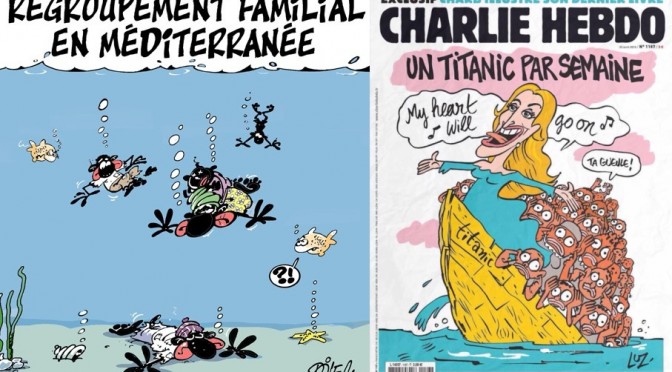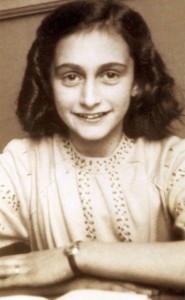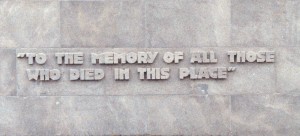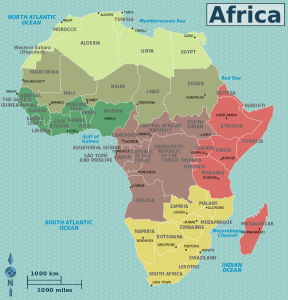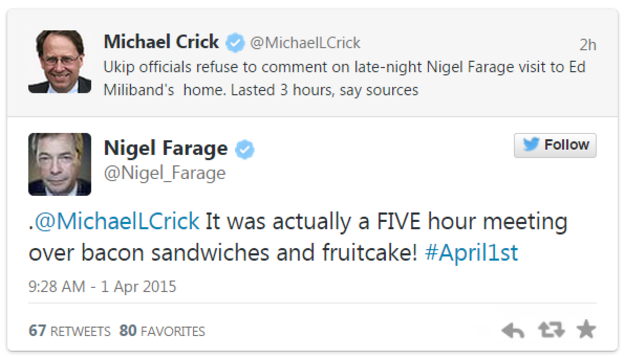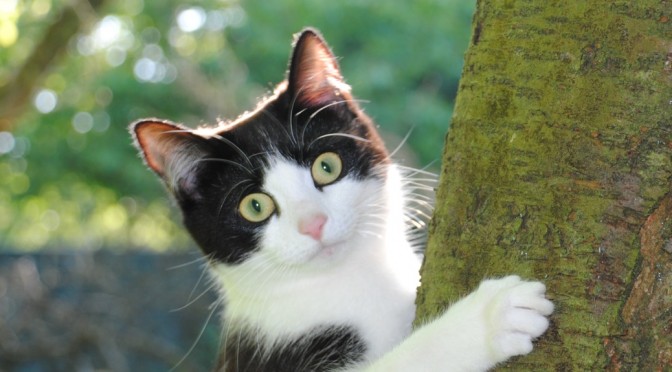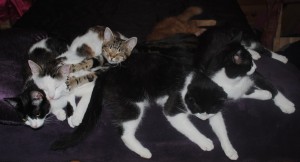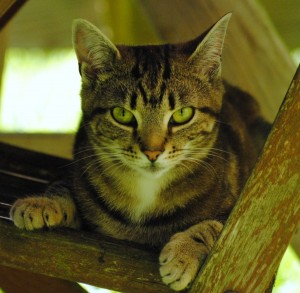Charlie Hebdo simultaneously attracts praise and criticism
Charlie Hebdo continues to inspire both writers’ rage and courage. It is to receive a PEN award for Freedom of Expression Courage and yet half-a-dozen writers are already staging a stay-away protest. It has also been condemned for an apparently migrant-bashing cartoon that it turns out was neither anti-Mediterranean migrant nor by the satirical magazine anyway. C’est la vie mais pas la vérité!
PEN Freedom of Expression Courage award
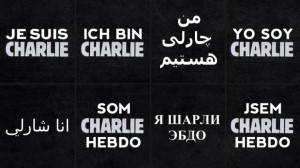
Following the terrorist attack on the Charlie Hebdo magazine offices in Paris in January this year, a social media and public protest campaign using the phrase “Je suis Charlie” went viral but also forced us to ask questions of whether satire always punches up or even gets it right at all.
A month ago PEN awarded the Charlie Hebdo magazine the PEN/Toni and James C. Goodale Freedom of Expression Courage Award, which is to be received in person by staff member Jean-Baptiste Thoret on 5 May in New York, who arrived to work late on January 7, “barely escaping the attack that killed eight of his co-workers and four others.”
“The Charlie Hebdo attacks dealt a blow to the bedrock principle that no act of expression, no matter how provocative or offensive, can justify violence”
Writers protest Charlie Hebdo PEN award
The double Booker Prize-winning novelist Peter Carey is one of a number of writers protesting the praise of Charlie Hebdo. In a New York Times interview he said the PEN award went beyond the organisation’s role of protecting freedom of expression against government oppression, saying:
“A hideous crime was committed, but was it a freedom-of-speech issue for PEN America to be self-righteous about? All this is complicated by PEN’s seeming blindness to the cultural arrogance of the French nation, which does not recognize its moral obligation to a large and disempowered segment of their population.”
The PEN International Charter states that:
- Literature knows no frontiers and must remain common currency among people in spite of political or international upheavals.
- In all circumstances, and particularly in time of war, works of art, the patrimony of humanity at large, should be left untouched by national or political passion.
- Members of PEN should at all times use what influence they have in favour of good understanding and mutual respect between nations; they pledge themselves to do their utmost to dispel race, class and national hatreds, and to champion the ideal of one humanity living in peace in one world.
It is, perhaps, questionable whether Charlie Hebdo or indeed PEN are doing their “utmost to dispel race…and national hatreds” or increasing “good understanding”.
Teju Cole, another of the protesting writers, wrote in January, shortly after the magazine massacre, an opinion piece in The New Yorker magazine, ‘Unmournable Bodies‘, in which he drew attention to Charlie Hebdo’s willingness to satirise and insult all, yet increasingly Islam, and highlighted Western hypocrisy:
“The West is a variegated space, in which both freedom of thought and tightly regulated speech exist, and in which disavowals of deadly violence happen at the same time as clandestine torture.”
There was some excellent and varied commentary upon the New Yorker piece on their Facebook page from French citizens bemoaning the lack of understanding of French satire and cultural context.
PEN and Human Rights
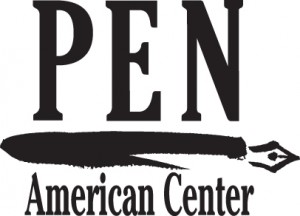 PEN International is one of the world’s oldest human rights organisations and the oldest international literary organsisation. The American Center is its largest regional body. PEN advocates on behalf of writers denied their human rights for writing, such as Raif Badawi.
PEN International is one of the world’s oldest human rights organisations and the oldest international literary organsisation. The American Center is its largest regional body. PEN advocates on behalf of writers denied their human rights for writing, such as Raif Badawi.
PEN justify Charlie Hebdo award
The current PEN America president, Andrew Solomon, has acknowledged the offence felt by some at Charlie Hebdo’s cartoons, but has added that PEN believed strongly in the “appropriateness” of the award:
“It is undoubtedly true that in addition to provoking violent threats from extremists, the Hebdo cartoons offended some other Muslims, as their cartoons offended members of the many other groups they targeted, but, based on their own statements, we believe that Charlie Hebdo’s intent was not to ostracise or insult Muslims, but rather to reject forcefully the efforts of a small minority to place broad categories of speech off-limits, no matter the purpose, intent or import of the expression. We do not believe that any of us must endorse the contents of Charlie Hebdo’s cartoons in order to affirm the principles for which they stand, or applaud the staff’s bravery in holding fast to those values in the face of life and death threats.”
PEN Executive Director Suzanne Nossel said:
“It is the role of the satirists in any free society to challenge the powerful and the sacred, pushing boundaries in ways that make expression freer and more robust for us all…In paying the ultimate price for the exercise of their freedom, and then soldiering on amid devastating loss, Charlie Hebdo deserves to be recognized for its dauntlessness in the face of one of the most noxious assaults on expression in recent memory.”
Salman Rushdie, a former PEN president and someone with the experience of people coming after him for what he wrote, said:
“If PEN as a free speech organization can’t defend and celebrate people who have been murdered for drawing pictures, then frankly the organization is not worth the name”
Mediterranean Migrants Cartoon case of Mistaken Identity
Charlie Hebdo was also, last week, condemned for a cartoon depicting drowning migrants (“people” for those of us with a streak of humanity) in the Mediterranean, on that platform of accurate factchecking – Twitter. Except it wasn’t a Charlie Hebdo cartoon, just by one of their newer cartoonists and published elsewhere in a French-Algerian publication, Liberté. The gross caricaturing of African migrants in it seems to fail the “punching up” test and appears to mock a humanitarian tragedy at sea.
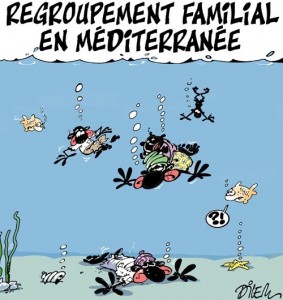
The double irony, however, was that the cartoon, condemned for racism among other things, was drawn by an Algerian, Ali Dilem, who was satirising French immigration policy (“regroupement familial”) and condemning the losses at sea because of that policy. Not everything is what is seems before we jump to judge.
“Ironically, Charlie Hebdo has actually done a magazine cartoon which condemns Europe over their inaction over the thousands of African migrants dying in the Mediterranean monthly.”
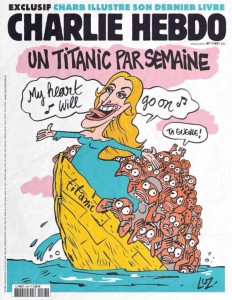
Furthermore, Charlie Hebdo has actually critiqued the Mediterranean migrants issue in its own cover-image cartoon based around the idea that a tragedy of Titanic proportions is happening each fortnight in the Med. Last year some 3,500 of 350,000 people escaping North Africa died at sea – that’s a similar number to the deaths in Nepal due to the recent earthquake. This year we’ve reached half than number in barely months.
It is a whole other question – to which I don’t have an answer, of whether disaster and loss, tragedy and terrorism, should be satirically pilloried at all, and if they are, how.
Human Writes and Wrongs
The right to offend should never be taken lightly, nor honoured without a thought to the consequences of what it may encourage. That is not to say that PEN is right or wrong in its award, perhaps that there might have been better, or safer, recipients. Playing it safe, though, is not what freedom of expression is about. The right to offend, satirise, challenge, does not mean that we should always write it. Think it, yes, voice it perhaps, but disseminate it – that is a choice, not just a right. Rights come with responsibilities – though, none that would suggest the Charlie Hebdo attack was merited or justifiable.
The responsibility for PEN, Charlie Hebdo, Liberté, and us all, I would caution, is that we need to take account of the context, culture and consequences, of what we write – draw or say, of how we depict not just what we depict. Sometimes, the end may not justify the means. Not all freedoms are equally important. Respect, however, should be mutual and equally carries the responsibility of two-way tolerance. To caveat what Voltaire never said: “I may not agree with what you say but I will defend to the death your right to say it and my right to critique the manner in which you said it, or whether it needed to be said at all.“
